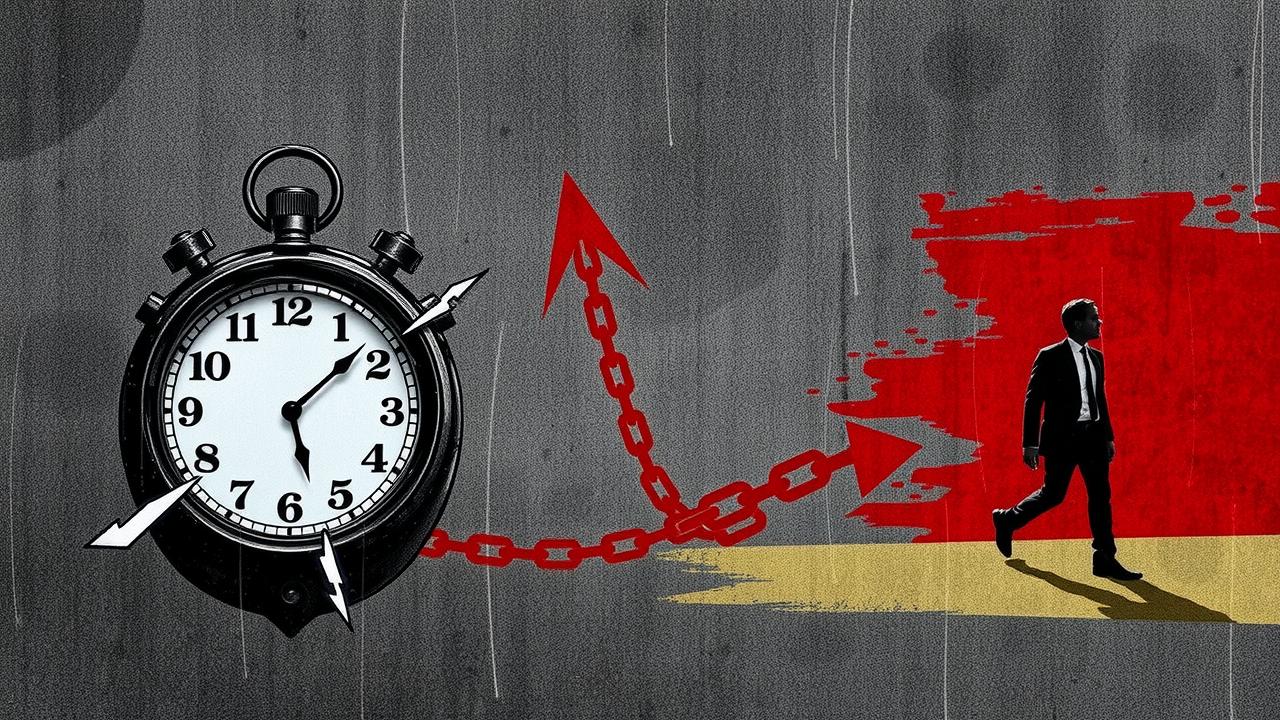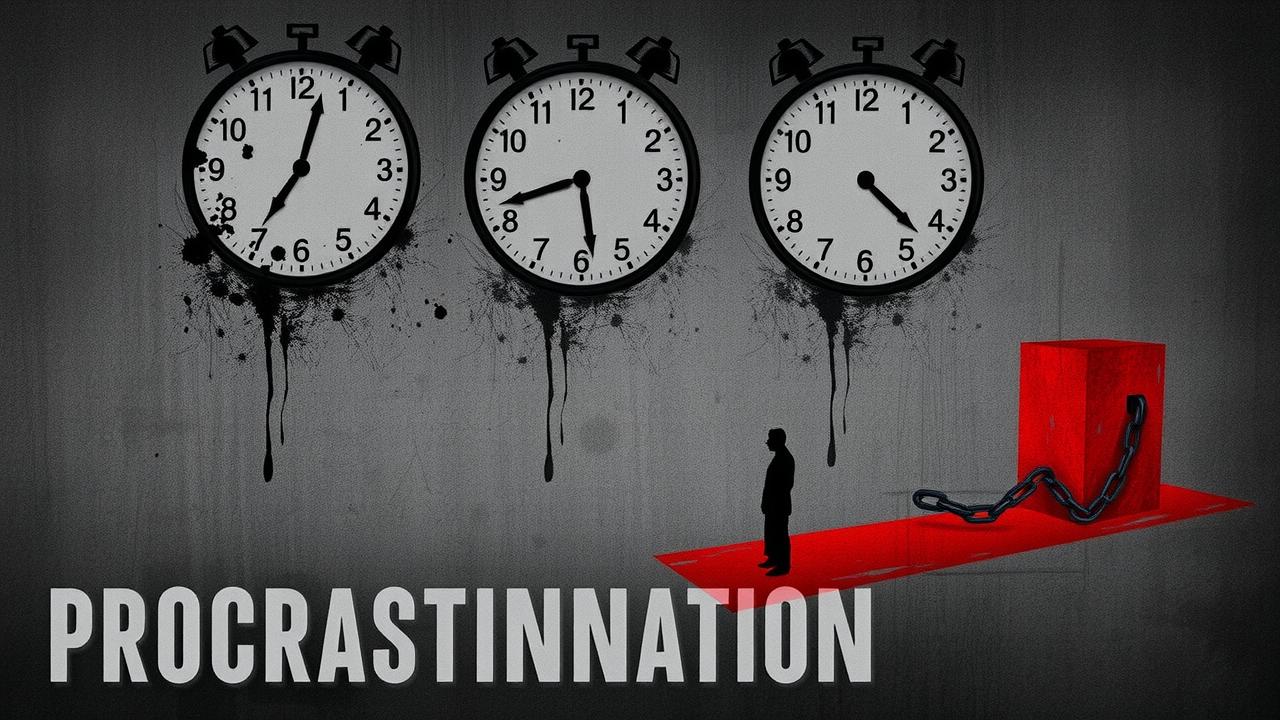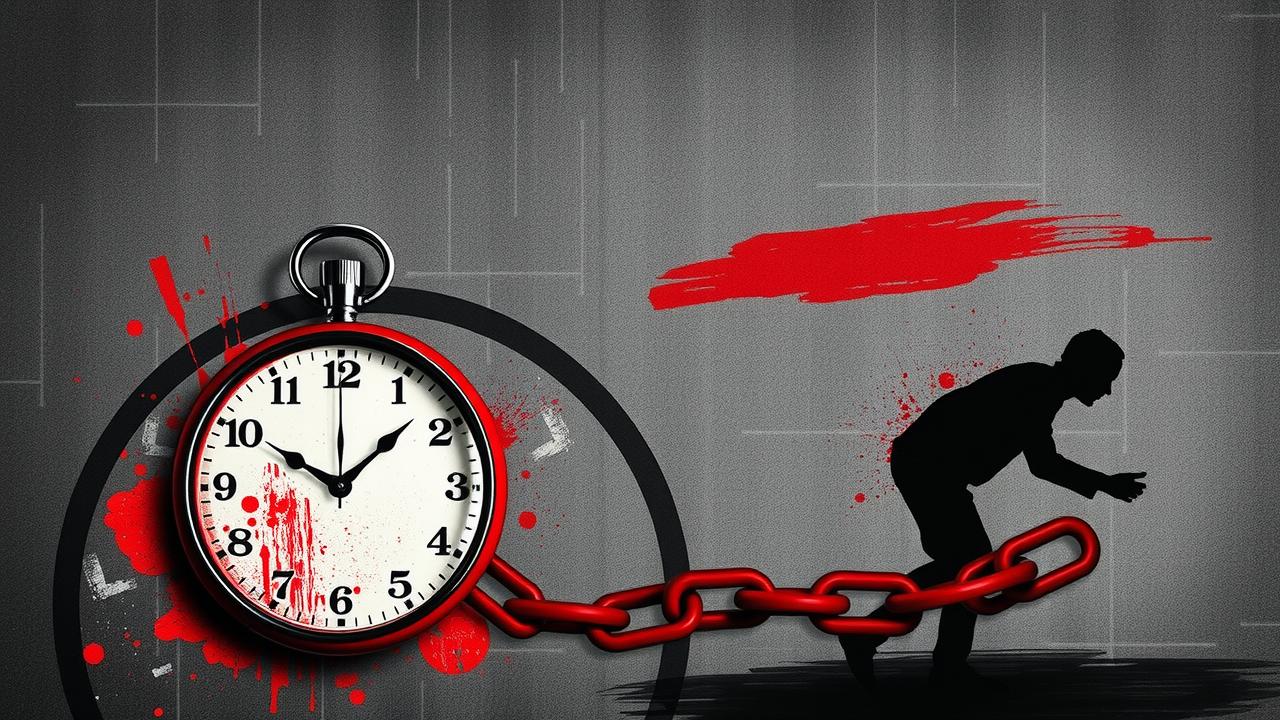Learn how to create crafts and develop your hobbies.
Latest Promotion

Latest Posts
OFFICIAL

Procrastination is the ENEMY of YOUR SUCCESS
Procrastination is a self-regulation challenge driven by fear that harms productivity and health. Start small, set goals, and limit distractions to break the cycle and build confidence.
Author: ugotguts10@gmail.com
OFFICIAL

Procrastination is the ENEMY of YOUR SUCCESS
Procrastination, linked to stress and fear, lowers productivity and confidence but can be managed by breaking tasks down, being kind to yourself, and setting small rewards.
Author: ugotguts10@gmail.com
OFFICIAL

Procrastination is the ENEMY of YOUR SUCCESS
Procrastination delays success by avoiding stress or anxiety tied to tasks, leading to missed opportunities and lower performance; small habit changes can help overcome it.
Author: ugotguts10@gmail.com
OFFICIAL

Procrastination is the ENEMY of YOUR SUCCESS
Procrastination affects many adults and students, leading to stress and lower performance. Break tasks into steps, set deadlines, and use time management to stay on track.
Author: ugotguts10@gmail.com
OFFICIAL

7 Easy Weight Loss Tips for Women
Lose weight with small changes: swap refined carbs for whole grains, add resistance training, drink water before meals, eat protein, get enough sleep, and track progress.
Author: ugotguts10@gmail.com
Procrastination is the ENEMY of YOUR SUCCESS
Table of Contents
- What Is Procrastination and How It Works
- Why Fear Drives You to Procrastinate
- How Procrastination Hurts Your Success and Health
- Who Procrastinates Most and Why
- Different Ways Procrastination Shows Up in Life
- Simple Steps to Stop Procrastinating Today
- How Changing Your Mindset Can Beat Procrastination
- Take Action Now: Break Tasks, Set Goals, and Eliminate Distractions
- Frequently Asked Questions
Procrastination is more than just putting things off; it’s a self-regulation problem where we choose short-term comfort over long-term success. Many people delay tasks because of fear, fear of failure, making decisions, or even succeeding. This causes stress, lower productivity, and missed opportunities in work or school. Research shows that procrastination isn’t just bad for performance but also harms mental and physical health. The key to overcoming it is to start small, set clear goals, and remove distractions like social media. Taking immediate action builds confidence and helps break the cycle before procrastination steals your chance at success.
What Is Procrastination and How It Works
Procrastination is the intentional delay of tasks even when we know putting them off could cause problems later. It’s not about external factors like bad weather or a busy schedule. Instead, it happens because we choose short-term comfort, like avoiding stress or discomfort, over the long-term benefits of completing a task. This is really a struggle with self-control, where emotions such as fear, anxiety, or simply feeling overwhelmed take priority over our goals. There are different ways procrastination shows up: delaying decisions, avoiding certain tasks, waiting for last-minute pressure to kick in, or even putting off going to sleep despite having no real reason to stay awake. Some people are active procrastinators, they intentionally put things off but still manage to meet deadlines. Others are passive procrastinators who delay unintentionally and face negative consequences because of it. Often, procrastination feels like a quick break or a way to dodge stress, but it usually ends up increasing stress over time. Many times, people don’t even realize they’re procrastinating because it feels like just taking a moment to rest. Recognizing these different forms helps us understand when and why procrastination happens, which is the first step toward overcoming it.
| Type of Procrastination | Description | Example |
|---|---|---|
| Decisional procrastination | Delay in making important decisions | Putting off choosing a college major |
| Avoidant procrastination | Avoiding tasks due to fear or anxiety | Not starting a presentation because of nervousness |
| Arousal procrastination | Waiting until last-minute pressure to act | Finishing a report the night before deadline |
| Bedtime procrastination | Delaying going to bed despite no external reasons | Scrolling social media late at night instead of sleeping |
| Active procrastination | Deliberately delaying tasks but still meeting deadlines | Waiting to start a project but finishing on time |
| Passive procrastination | Unintentionally delaying tasks and facing negative outcomes | Missing a deadline because of indecision |
Why Fear Drives You to Procrastinate
Fear plays a huge role in why we put things off. Often, people delay starting tasks because they’re afraid of failing and damaging how they see themselves. This fear of failure acts like a shield, making it safer to avoid trying than to risk falling short. Another common fear is disappointing others, which causes hesitation because we don’t want to let people down or face their judgment. Some even fear success, as it brings new pressures and responsibilities that feel overwhelming. When goals aren’t clear or decisions feel uncertain, it’s easier to stall and avoid making tough choices. Distractions like social media become tempting escapes to dodge uncomfortable feelings tied to fear. Low self-discipline and impulsiveness make it harder to resist these distractions, increasing the chances of procrastination. High anxiety and emotional ups and downs add another layer of difficulty in managing tasks reliably. People with lower emotional intelligence often struggle more because they find it tough to handle the emotions that trigger procrastination. Avoiding tasks might reduce stress for a moment but usually leads to bigger problems later on. Understanding these fears is key to developing better ways to face tasks head-on instead of running away from them.
How Procrastination Hurts Your Success and Health
Putting off tasks might seem harmless at first, but it often leads to lower quality work and missed chances for growth. For students, procrastination usually means worse grades because assignments and studying get rushed or skipped. At work, delaying important projects can slow down promotions and hurt overall job performance. Beyond just professional setbacks, procrastination piles up stress and anxiety as deadlines loom closer and unfinished tasks multiply. Over time, this chronic delay can cause feelings of guilt and lower self-esteem, creating a cycle that’s hard to break. Physical health also takes a hit when people put off doctor visits or avoid forming healthy habits. For example, bedtime procrastination, staying up late despite no reason to, disrupts sleep, reducing energy and focus the next day. As procrastination spreads across different areas of life, overall satisfaction drops both personally and professionally. When leaders procrastinate, the consequences can extend beyond the individual, negatively impacting society by delaying important decisions. Recognizing these effects is the first step toward making small changes that protect your success and well-being in the long run.
Who Procrastinates Most and Why
Procrastination affects a wide range of people, but some groups tend to struggle more than others. For example, up to 95% of college students admit to procrastinating at least sometimes, making academic settings a hotspot for putting off tasks. Around 20% of adults describe themselves as chronic procrastinators, meaning they delay important tasks regularly enough that it affects their success and well-being. Procrastination doesn’t discriminate by age or life area, it shows up in school, work, health, and even leisure activities. Women generally procrastinate less than men in academic environments, which may be linked to differences in motivation, time management, or social expectations. Personality traits play a big role too: people with low conscientiousness, who tend to lack self-discipline and organization, and those with high neuroticism, who experience more anxiety and emotional instability, are more prone to procrastination. Poor time management skills only make it harder to stay on track, increasing the tendency to delay. Anxiety and perfectionism can also fuel procrastination because people avoid tasks to escape feelings of fear or not being good enough. At work, unclear job roles or tasks that feel unpleasant can lead to putting things off as well. In today’s digital world, distractions like social media are major culprits, tempting people away from their priorities. Knowing who procrastinates and why helps create better ways to support people, whether through coaching, time management training, or addressing underlying fears and habits.
Different Ways Procrastination Shows Up in Life
Procrastination can sneak into different parts of your life in surprising ways. In academics, it often looks like delaying homework or studying, usually because of stress or feeling overwhelmed. At work, procrastination might happen when tasks seem unpleasant or unclear, making it hard to get started. There’s also bedtime procrastination, where you put off going to sleep even though nothing is stopping you, which can harm your energy and focus the next day. Social media and constant notifications are common distractions that break your concentration and delay important work. Procrastination doesn’t just affect individuals, it can spread in groups when one person’s delay slows down the entire team. Sometimes people keep busy with low-value tasks that feel productive but don’t actually move their goals forward. Others get stuck overthinking decisions instead of taking action, or avoid tasks that make them uncomfortable because of emotional reasons. Procrastination also shows up in personal life, like putting off doctor visits or tough conversations. Recognizing these different forms early on helps you catch procrastination before it grows and find ways to overcome it.
Simple Steps to Stop Procrastinating Today
One effective way to stop procrastinating is to break big tasks into smaller, manageable parts. When a project feels overwhelming, dividing it into easy steps makes it less intimidating and helps you build momentum. Before diving in, gather all the information you need so you feel more prepared and confident to start. Don’t wait for the perfect moment to begin; that perfect time rarely comes. Instead, start with whatever you can do right now, even if it’s just a small part. Remember, making mistakes is part of learning, not a sign of failure, so allow yourself to try and adjust as you go. Creating a distraction-free environment is key: turn off notifications and find a quiet space where you can focus. To stay on track, prioritize your tasks by importance and urgency, so you’re always working on what matters most. Using timers or scheduling blocks of time can help manage your day better and keep you accountable. If you find negative thoughts about tasks creeping in, try challenging them with cognitive-behavioral techniques, like asking yourself if those thoughts are really true or helpful. For those dealing with chronic procrastination, seeking professional help such as therapy can provide tailored strategies and support. Finally, celebrate small wins along the way. Every completed step is progress, and recognizing these moments boosts motivation and confidence for the bigger challenges ahead.
- Break big tasks into smaller, easy-to-handle parts to reduce overwhelm.
- Gather the information you need before starting to feel more prepared.
- Stop waiting for the perfect time; start immediately with whatever is possible.
- Accept that making mistakes is part of learning and not a failure.
- Remove distractions by turning off notifications and setting a quiet workspace.
- Prioritize tasks by importance and urgency to focus on what matters most.
- Use timers or schedules to manage your time better and stay on track.
- Try cognitive-behavioral techniques like challenging negative thoughts about tasks.
- Consider professional help if procrastination is chronic and hard to overcome.
- Celebrate small wins to build motivation and confidence for bigger tasks.
How Changing Your Mindset Can Beat Procrastination
Procrastination often starts with fear, fear of failing or not doing things perfectly. Changing your mindset means shifting that fear into curiosity and a desire to learn. When you see each task as an opportunity to grow rather than a test you might fail, it becomes easier to start. Instead of waiting to feel ready or perfect, recognize that taking imperfect action is still progress. Every small step builds confidence and helps you move forward. Remember, procrastination is a habit, not who you are. By facing discomfort little by little, like tackling a task for just five minutes, you build tolerance and reduce the urge to avoid it. Focus on progress instead of perfection; this takes the pressure off and makes starting less intimidating. Use positive self-talk: encourage yourself with phrases like “I can do this” or “Starting is the hardest part.” Visualize how good it will feel to finish the task and the relief it will bring. When you slip up, be kind to yourself and gently return to your goals without harsh judgment. Commit to consistent, small actions every day because they add up, turning new habits into lasting change. This mindset shift helps you move past avoidance, making success more reachable and procrastination less powerful.
Take Action Now: Break Tasks, Set Goals, and Eliminate Distractions
To beat procrastination, the first step is to understand what triggers it for you. It might be fear of failure, feeling overwhelmed, or simply distractions like your phone or social media. Once you identify these triggers, you can take control by breaking big tasks into smaller, clear steps. For example, if you need to write a report, start with outlining the key points before tackling the entire document. Assign deadlines to each step to keep yourself on track. Setting specific, measurable goals is also key, it gives you a clear target and motivation to move forward. To protect your focus, create a workspace free from distractions: turn off notifications, put your phone away, or use apps that block social media during work time. Organize your day with to-do lists or calendars, and start with the easiest task to build momentum. Remember to schedule short, purposeful breaks to recharge without losing your flow. Using reminders or alarms can help you stay aware of what you planned to do next. If you find it hard to stay accountable, ask a friend or coworker to check in with you. The best way out of procrastination is action, even if it’s small. Taking that first step breaks the cycle of delay and moves you closer to your success.
Frequently Asked Questions
1. How does procrastination affect my chances of achieving success?
Procrastination can slow down your progress by delaying important tasks and goals. When you put things off, you waste valuable time and miss opportunities to grow, learn, and move forward, which can ultimately hold you back from reaching your full potential.
2. What psychological factors make procrastination such a common struggle?
Many people procrastinate because of fear of failure, lack of motivation, or feeling overwhelmed by tasks. Sometimes, it’s easier to delay work to avoid stress or uncertainty, even though it creates more pressure later on and hurts productivity.
3. Can breaking tasks into smaller steps really help me overcome procrastination?
Yes, breaking big tasks into smaller, manageable steps makes them feel less intimidating. This approach helps you focus on one part at a time, reduces stress, and builds momentum, making it easier to start and keep going without putting things off.
4. Why is self-discipline important in fighting procrastination for long-term success?
Self-discipline helps you stick to your plans and resist distractions even when you don’t feel like working. Developing this habit means you’ll consistently take action toward your goals, which leads to steady progress and better chances of achieving lasting success.
5. How can setting clear goals help reduce the habit of procrastination?
Having clear and specific goals gives you a roadmap to follow. When you know exactly what you want to achieve and why it matters, it’s easier to stay motivated and focused, which reduces the urge to delay or avoid important tasks.
TL;DR Procrastination is the habit of delaying tasks even when we know it hurts our goals and well-being. It’s often driven by fear, fear of failure, judgment, or even success, and linked to traits like low self-discipline and high stress. This behavior can damage your productivity, mental and physical health, and overall life satisfaction. It shows up in many areas, from school and work to bedtime routines and digital distractions. To overcome it, start by breaking tasks into small steps, set clear goals, remove distractions, and change your mindset to embrace action over avoidance. Remember, every moment spent procrastinating is time lost from reaching your potential. Take control now and build your path to success.
Share on
Procrastination is the ENEMY of YOUR SUCCESS
Table of Contents
- What Is Procrastination and Why Do We Do It
- Common Causes Behind Procrastination
- How Procrastination Hurts Your Success and Health
- Research Findings on Procrastination Effects
- Ways to Change Your Mindset About Tasks
- How Self-Kindness Helps Beat Procrastination
- Using Rewards to Stay Motivated
- Breaking Tasks Into Smaller Steps
- Tips to Manage Emotions and Stress
- Cutting Out Distractions to Focus Better
- Recognize and Accept Your Procrastination Habits
- Start Small and Build Momentum Today
- Be Patient and Celebrate Every Win
- Ask for Help When Procrastination Feels Overwhelming
- Take Action Now to Stop Procrastination and Succeed
- Frequently Asked Questions
Procrastination often feels like just putting things off for later, but it can seriously hold you back from success. It’s not just about poor time management, usually, it’s tied to tough emotions like stress or fear of failing. When you delay important tasks and choose short-term distractions instead, it creates more stress and lowers confidence over time. Studies show procrastination hurts academic performance and job productivity while increasing anxiety and even physical health problems. The good news is, by understanding why we procrastinate and using simple steps like breaking tasks down, practicing kindness toward yourself, and setting small rewards, you can get on track to reach your goals.
What Is Procrastination and Why Do We Do It
Procrastination means putting off tasks even when we know delaying them will cause problems later. The word itself comes from Latin and Greek roots that mean “to put off until tomorrow” and “acting against better judgment.” Almost everyone procrastinates at some point, up to 95% of students and many adults admit to it. There are two main types: chronic procrastination, which is a long-term habit, and situational procrastination, where delays happen only with certain tasks. Often, people choose quick distractions like scrolling social media or watching TV instead of tackling important work. Sometimes procrastination hides behind doing other, less important chores to avoid the real task. It’s like a tug-of-war between what we want right now and what we need to do for the future. Importantly, procrastination isn’t about laziness; it’s tied to how our brain handles emotions. Our brain’s reward system prefers quick relief from stress or boredom, making it tempting to delay. Knowing that procrastination is normal and linked to our emotions can help reduce the guilt we often feel when we put things off.
Common Causes Behind Procrastination
Procrastination often isn’t about poor time management but about struggling with unpleasant emotions tied to the task at hand. Feelings like stress, anxiety, or fear can make even simple tasks feel overwhelming, leading people to avoid them as a way to escape discomfort. This avoidance is a form of emotional regulation failure, where the brain chooses short-term relief over long-term goals. For example, instead of starting a work project, someone might scroll social media to distract themselves from stress. Low self-esteem and fear of judgment also play a big role. When you doubt your abilities or worry about how others will see your work, starting feels intimidating. Perfectionism adds another layer: the fear of making mistakes can keep you stuck, delaying both starting and finishing tasks. Lack of clear motivation or goals makes it even easier to put things off, as there’s no strong emotional drive pushing you forward. Neuroscience shows procrastination involves the prefrontal cortex (which handles planning and self-control) and the limbic system (which processes emotions). When stress levels rise, the hormone cortisol spikes, making it harder to focus and remember things, which worsens procrastination. Sometimes, procrastinating serves as a way to protect your self-worth by avoiding the risk of failure altogether. Understanding these causes highlights that procrastination is more about managing emotions than just managing time.
How Procrastination Hurts Your Success and Health
Procrastination doesn’t just slow you down, it can seriously hurt your success and well-being. When you put off important tasks, you risk missing deadlines at school or work, which lowers your academic performance and stalls career growth. This pattern of delay builds up, making it harder to keep up with responsibilities and opportunities. On top of that, unfinished tasks create a constant pressure that increases stress and anxiety. Over time, this can lead to feelings of guilt, lower self-confidence, and even depression. The stress from procrastination doesn’t just affect your mind; it can weaken your immune system by raising stress hormones, making you more prone to illness. You might also notice physical symptoms like headaches, muscle tension, and trouble sleeping, all linked to the chronic stress caused by delaying tasks. This creates a vicious cycle: stress makes it harder to focus, which leads to more procrastination, and the cycle repeats. As missed opportunities and poor results pile up, they reinforce negative feelings, draining your energy and motivation. In the end, procrastination wears down both your mental and physical health, standing in the way of the success and well-being you deserve.
Research Findings on Procrastination Effects
Research consistently shows procrastination is more than just a bad habit, it has real effects on our minds and bodies. A 1997 study found that students who procrastinated felt less stress early on but faced higher stress, more illness, and worse grades as the semester went on. More recent studies back this up, linking procrastination to guilt, anxiety, and poorer academic results. Neuroscience has added another layer of understanding by showing that during procrastination, the body releases more cortisol, a stress hormone, which in turn harms memory and focus. Brain scans support this by revealing less activity in self-control areas when people procrastinate. This isn’t just a temporary issue either, long-term procrastinators tend to have persistently higher stress hormone levels and weaker cognitive abilities. What’s striking is how closely procrastination ties to mental health problems like anxiety and depression, acting both as a cause and an effect. On a more hopeful note, experimental research suggests that introducing small rewards can help rewire the brain to break procrastination habits. Emotional regulation also plays a key role; learning to manage feelings effectively can interrupt the cycle of delay. These findings highlight that tackling procrastination isn’t just about better time management, it’s about addressing emotions and mindset too.
| Study / Source | Key Findings |
|---|---|
| 1997 Longitudinal Study | Procrastinating students felt less stress early but more stress, illness, and lower grades later in the semester. |
| Behavioral Sciences (2023) | Academic procrastination causes guilt, stress, and poor performance. |
| Neuroscience Research | Cortisol spikes during procrastination impair memory and focus. |
| Mental Health Studies | Procrastination is linked to anxiety and depression symptoms, acting as both cause and effect. |
| Brain Imaging Studies | Lower activity observed in self-control brain areas during procrastination episodes. |
| Experimental Studies | Small rewards can retrain the brain and reduce procrastination habits. |
| Emotional Regulation Research | Focus on feelings and mindset is key to breaking procrastination cycles. |
| Cortisol and Cognitive Function | Long-term procrastination leads to higher stress hormone levels and weakened cognition. |
| Leadership & Motivation Insights | Interventions should aim at emotion management, not just time management. |
| Summary of Findings | Procrastination negatively affects stress, health, performance, and mental well-being. |
Ways to Change Your Mindset About Tasks
Changing how you think about tasks can make a big difference in beating procrastination. Instead of seeing tasks as a burden, try to view them as chances to grow or achieve something meaningful. For example, telling yourself, “This will help me learn” or “Completing this moves me forward” can create a positive association with the work. Focus more on the benefits of finishing rather than the difficulty of starting. Remember, tasks don’t have to be perfect; done is better than perfect. Breaking big tasks into smaller, manageable steps can reduce overwhelm and make it easier to begin. Setting clear and realistic goals gives you direction and motivation. Visualizing the feeling of success after finishing a task can also boost your drive. Practicing gratitude for your ability to work and improve helps shift your mindset to a more positive place. When negative thoughts creep in, replace them with kind and encouraging messages. Remind yourself that every effort builds your skills and confidence over time. These shifts in mindset create a healthier, more productive way to approach your work and help keep procrastination at bay.
How Self-Kindness Helps Beat Procrastination
Being kind to yourself can make a big difference when facing procrastination. Often, harsh self-criticism only adds fuel to the delay, making tasks feel even harder to start. When you practice self-compassion, you allow yourself to forgive mistakes and let go of the shame that comes with putting things off. Imagine treating yourself the same way you would a good friend who’s struggling with similar challenges, offering encouragement instead of judgment. Understanding that procrastination is a common experience and doesn’t define your worth can ease the pressure you put on yourself. Instead of focusing solely on what’s left undone, remind yourself of your strengths and past successes to build confidence. This gentle approach lowers stress, which is a key factor driving procrastination in the first place. Taking care of your body with enough rest, healthy food, and regular exercise also supports your mental well-being, making it easier to focus and take action. Rather than pushing yourself with guilt or harsh reminders, try using gentle prompts to encourage progress. Celebrate even the smallest wins along the way to create positive feelings about the work you’re doing. By being kind to yourself, you create a safe space to try again after setbacks instead of falling into a cycle of delay and self-blame.
Using Rewards to Stay Motivated
Pairing task completion with small, immediate rewards makes work feel more appealing and helps keep you motivated. These rewards might be short breaks, a favorite snack, or a quick activity you enjoy, things you genuinely look forward to. When you consistently link productivity with pleasure, your brain starts to associate getting things done with positive feelings, making it easier to stay on track. Before you dive into work, plan your rewards clearly so you have something to look forward to as you progress. Breaking long tasks into shorter segments and rewarding yourself after each part can turn overwhelming projects into manageable, satisfying experiences. Choose rewards that truly motivate you personally and avoid ones that might distract you or leave you feeling guilty afterward. Keep track of your progress and reward yourself regularly to build a strong habit of motivated work. To keep things fresh, try varying your rewards so motivation doesn’t grow stale. Just remember, rewards are tools to support your drive, not a replacement for your own internal motivation. For example, after finishing a report, treat yourself to a 10-minute walk or your favorite coffee, something that feels like a real treat without pulling you too far off course.
Breaking Tasks Into Smaller Steps
When facing a large project, it’s easy to feel overwhelmed and stuck. Breaking the task into smaller, clear steps makes it feel more manageable and less intimidating. Instead of staring at the whole project, focus on one simple step at a time. This approach helps reduce fear and perfectionism because each step feels doable. Using checklists to track these steps can be very motivating, you get to see your progress and feel accomplished as you check off items. Setting mini-deadlines for each step keeps you on track and prevents last-minute rushes. Plus, when you plan steps ahead, starting is easier since you know exactly what to do next. The brain maintains focus better with bite-sized goals, avoiding the overload that can cause procrastination. Don’t forget to celebrate completing each step, even small ones, because that builds momentum and confidence. If needed, adjust the steps to fit your current energy and pace, making the process flexible. For example, instead of “write report,” try “draft introduction,” then “create outline,” and so on. This method turns daunting tasks into achievable actions, making progress steady and stress lower.
Tips to Manage Emotions and Stress
Managing emotions and stress plays a big role in beating procrastination. Practicing mindfulness can help you stay present and notice your feelings without judging them, which makes it easier to handle stress without getting overwhelmed. When anxiety builds up, deep breathing exercises work well to calm your mind and body, reducing tension so you can focus better. It’s also important to accept that negative feelings like fear or frustration are normal; instead of letting them control you, acknowledge them and move forward. Taking short breaks during work gives your mind and body a chance to relax, preventing burnout and keeping you refreshed. Regular exercise is another great way to boost your mood and relieve built-up stress. Sleep matters too, getting enough rest helps your brain manage emotions and keeps your focus sharp. Sharing your feelings with trusted friends or mentors lightens your emotional load and can provide new perspectives. Writing down your worries can clear mental clutter, making problems feel more manageable. When self-doubt or fear creeps in, use positive self-talk to encourage and motivate yourself, turning negative thoughts around. If stress or anxiety feels too heavy or constant, don’t hesitate to seek professional help; it’s a strong step toward gaining control and moving past procrastination.
Cutting Out Distractions to Focus Better
Distractions like social media, phone alerts, and noisy surroundings are some of the biggest obstacles to staying focused. To work better, start by creating a quiet, organized workspace that’s dedicated just to your tasks. Turn off or silence your phone and other digital devices while you work to avoid interruptions. You can also use apps that block distracting websites or limit your screen time during work periods. Planning specific work sessions with scheduled breaks helps maintain your concentration without feeling overwhelmed. Letting others know your work schedule can reduce unexpected interruptions, so you can stay in the zone. Keep only what you need on your desk to avoid clutter that might pull your attention away. Try focusing on one task at a time instead of multitasking, which can split your attention and lower productivity. Using a timer, like the Pomodoro technique, can help you work in short, focused bursts followed by rest, improving your overall focus. Finally, regularly check your environment and adjust it as needed to keep it supportive of your attention and minimize distractions.
- Identify common distractions like social media, phone notifications, or noisy environments.
- Create a quiet, organized workspace dedicated to focus.
- Turn off or silence digital devices during work time.
- Use apps or tools that block distracting websites or limit screen time.
- Set specific work periods with planned breaks to maintain focus.
- Inform others of your work schedule to reduce interruptions.
- Keep only necessary materials on your desk to avoid clutter.
- Practice single-tasking by focusing on one task at a time.
- Use timers like the Pomodoro technique to work in focused bursts.
- Review and adjust your environment regularly to support sustained attention.
Recognize and Accept Your Procrastination Habits
Procrastination means delaying actions even when you know it will cause harm. Almost everyone struggles with this at some point, studies show up to 95% of people procrastinate. The first step is to honestly identify your own procrastination patterns. What kinds of tasks do you tend to put off? Is it big projects, difficult decisions, or maybe unpleasant chores? Pay attention to the feelings that come up, stress, fear, or anxiety often trigger the delay. Sometimes procrastination hides in plain sight, disguised as busywork like tidying up or replying to less urgent emails instead of tackling what really matters. Remember, procrastination is less about poor time management and more about how you handle your emotions. You might find yourself seeking quick relief through distractions such as social media or TV to avoid uncomfortable feelings. Being honest about how procrastination affects your goals and wellbeing is important. Resisting the urge to delay isn’t just about willpower; it’s about learning to manage those emotions that hold you back. Accepting that procrastination is part of your current habits, without harsh self-judgment, creates a foundation for real change.
Start Small and Build Momentum Today
When facing a big task, breaking it down into tiny, manageable steps can make a huge difference. Instead of feeling overwhelmed by the whole project, focus on just the very next action. For example, if you need to write a report, start by opening a blank document or jotting down a single idea. Committing to work for just five minutes often helps overcome the initial resistance, and more times than not, those five minutes turn into much longer periods of focused effort. Using a simple to-do list to organize these small steps lets you track your progress without pressure, making every checkmark a small win that boosts your confidence. It’s important to set realistic goals that fit how you feel in the moment, so you don’t burn out trying to do too much at once. Also, creating a clear starting point for each task reduces hesitation, knowing exactly where to begin removes a big mental barrier. Instead of worrying about the outcome or trying to be perfect right away, focus on taking action. This shift helps build momentum and quiets the inner critic that often fuels procrastination. Before you start, try to remove distractions like your phone or background noise, so your attention stays on the task at hand. Remember, progress may feel slow at first, and that’s okay. Be patient with yourself as momentum grows step by step. The hardest part is often just starting; once you do, moving forward usually feels easier and more natural.
Be Patient and Celebrate Every Win
Overcoming procrastination is a journey that takes time, so it’s important to be patient with yourself. Change doesn’t happen overnight, and recognizing this helps reduce stress and frustration. Celebrate every win, no matter how small, because these moments build positive momentum. For example, finishing a single paragraph or making a quick call counts as progress. Reward yourself with simple pleasures, like a short break or a favorite snack, after completing tasks to create a positive link between work and enjoyment. When setbacks happen, avoid harsh self-criticism and practice self-compassion instead. Kindness toward yourself improves emotional balance and makes it easier to keep going. Tracking your progress visually, such as checking off items on a to-do list or marking a calendar, can boost confidence and remind you how small victories add up to bigger achievements over time. Focus on your own pace rather than comparing yourself to others. Reflect on what strategies worked well after each task to learn and grow. By being patient and celebrating every step forward, you build motivation and reduce the anxiety that often fuels procrastination.
Ask for Help When Procrastination Feels Overwhelming
When procrastination starts to feel like too much to handle, it’s important to recognize that you don’t have to face it alone. Sometimes, procrastination causes significant stress or stops you from moving forward, and that’s a clear sign to reach out for support. Talking to friends, mentors, or colleagues can provide encouragement and keep you accountable. They can help you stay on track and remind you of your goals when your motivation dips. If procrastination is tied to feelings of anxiety, depression, or low self-esteem, consider seeking professional help. Therapists and counselors can offer personalized strategies to manage these emotions and work through the root causes. Joining study groups or work sessions is another way to create a structured environment that reduces isolation and makes starting tasks easier. Sharing your goals and struggles openly helps reduce shame and invites understanding and support from others. Asking for feedback on your work can also help overcome fears of judgment and perfectionism, which often fuel procrastination. Professionals might recommend mindfulness or stress management programs that teach techniques to stay calm and focused. Remember, asking for help is a sign of strength, not weakness, and building a support network that understands your challenges can be a powerful motivator on your path to success.
Take Action Now to Stop Procrastination and Succeed
Understanding that procrastination is really about managing difficult emotions, not a failure of willpower, is the first step toward change. Instead of seeing tasks as chores, try to reframe them as chances to grow or achieve something meaningful. For example, rather than thinking “I have to write this report,” remind yourself, “Completing this report will help me get closer to my goals.” Using positive affirmations like this can help shift your mindset before you begin. One practical way to break the cycle of delay is to start immediately, even if it’s just for five minutes. That small action creates momentum and reduces the feeling of overwhelm. Pair your progress with a reward system, after finishing a task, treat yourself to something enjoyable, like a short walk or your favorite snack. This helps your brain link productivity with positive feelings. To stay focused, limit distractions by turning off social media notifications or putting your phone out of reach when working. Practicing mindfulness or deep-breathing exercises can also calm your mind and improve concentration. Set clear deadlines and share your goals with someone you trust, that external accountability can encourage you to stick with your plans. Don’t forget to take care of your body, too; regular exercise, enough sleep, and balanced nutrition support better focus and emotional balance. Remember, success is built through consistent, timely actions. Each small step forward reduces stress and brings you closer to your goals, so choose to act now and keep moving ahead.
Frequently Asked Questions
1. How does procrastination affect my chances of being successful?
Procrastination holds you back by delaying important tasks and decisions. When you put things off, you miss opportunities to learn, grow, and reach your goals on time. This habit can lead to stress and lower confidence, which makes success harder to achieve.
2. What are some common reasons people procrastinate even when they want to succeed?
People often procrastinate because they feel overwhelmed, afraid of failure, or unsure where to start. Sometimes, distractions and lack of motivation also play a big role. Understanding these reasons can help you tackle procrastination more effectively.
3. Can small changes in daily habits really help overcome procrastination?
Yes, making small, consistent changes like breaking tasks into smaller steps, setting clear deadlines, and minimizing distractions can make a big difference. Over time, these habits build momentum and help you stay on track toward your success.
4. Is procrastination linked to how we manage stress or emotions?
Absolutely. Procrastination often serves as an escape from uncomfortable feelings like stress, anxiety, or self-doubt. Learning better ways to handle these emotions can reduce the urge to delay tasks and improve your focus and productivity.
5. What are some effective techniques to stop procrastinating and boost productivity?
Techniques like the Pomodoro method (working in focused intervals), prioritizing tasks based on importance, and setting specific goals can help. Also, creating a routine, staying accountable to someone, and rewarding progress make it easier to overcome procrastination and move closer to success.
TL;DR Procrastination is the habit of delaying tasks even when it hurts your success and well-being. It often stems from struggling to manage stress, anxiety, or fear related to a task, rather than just poor time management. This habit can lead to lower productivity, increased stress, and negative effects on both mental and physical health. Research shows procrastination creates a cycle that hurts your focus and performance. To overcome it, try changing how you view tasks, be kind to yourself, use rewards, break work into smaller steps, and limit distractions. Recognize when you’re procrastinating, start small, celebrate progress, and ask for help if needed. Taking action now helps you move past delay and toward your goals.




